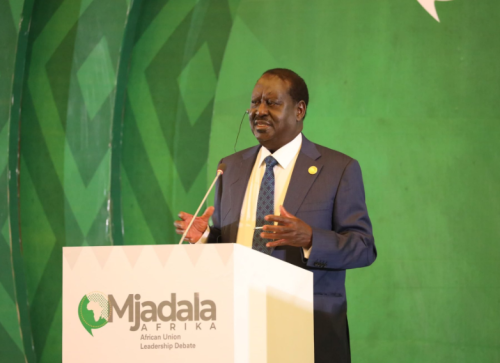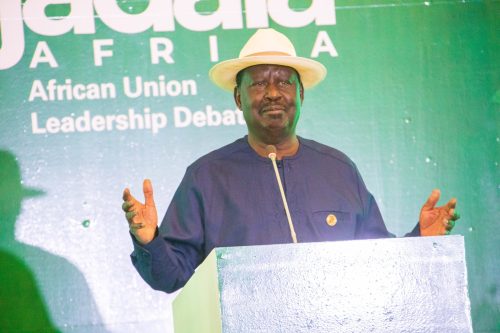AUC debate: 5 major takeaways from Raila’s address
By Martin Oduor, December 14, 2024Raila Odinga made a compelling case for Africa’s transformation during the Mjadala Afrika debate held in Addis Ababa, Ethiopia, on Friday, December 13, 2024.
As a contender for the position of African Union Commission (AUC) Chairperson, Raila articulated a vision centred on empowering the continent on the global stage and addressing systemic inequalities.
Here are five major takeaways from his address:
1. Permanent UN Security Council seats for Africa
Raila proposed a bold plan to secure two permanent seats for Africa at the United Nations Security Council (UNSC).
He underscored the urgency of granting veto powers to African representatives, ensuring the continent has a meaningful voice in global security matters.
“This is long overdue. The UN was formed at a time when most African countries were colonies, and that’s why it doesn’t deal with the realities of today,” Raila stated.
“We’re going to insist Africa gets two permanent seats in the Security Council. We cannot be excluded when Europe has three seats. Permanent representation with veto powers is a must,” he added.
Raila’s argument highlighted the disparity in representation, with only five permanent members, China, Russia, France, the UK, and the US, currently wielding veto powers.
2. Restructuring international financial systems
Raila criticized the international financial structure, saying that it disadvantages African nations through high-interest loans compared to other continents of similar status.
“The international financing structure has worked against Africa because countries borrow at high interest rates compared to other nations,” he remarked.
Adding that; “Africa is the richest in terms of resources, but it’s also the poorest in terms of living conditions.”
Raila proposed creating a pool of funds within Africa to provide low-interest loans, thereby reducing dependency on exploitative international lenders.

3. Enhancing intra-African trade
Raila emphasized the importance of enhancing trade within the continent, arguing that it is a key driver of economic growth and integration.
“Africa must enhance trade with itself. This is vital for unlocking the continent’s economic potential,” he said.
He linked trade with other critical sectors like agriculture, free movement, and energy, advocating for a holistic approach to development.
4. Realizing the founding fathers’ vision
Raila vowed to pursue the dreams of Africa’s founding fathers, emphasizing unity, prosperity, and self-reliance.
He pledged to lead efforts to actualize their vision if elected AUC Chairperson.
“I am going to lead from the front to ensure that we achieve the vision of the founding fathers of our continent,” he said.
His agenda includes boosting trade, achieving agricultural transformation, enabling free movement, and addressing energy needs – all while fostering unity across the continent.
5. Addressing Africa’s developmental challenges
Raila highlighted Africa’s paradox as the richest continent in resources but the poorest in living conditions.
He called for an urgent restructuring of international financial and trade systems to promote development and alleviate poverty.
“Africa is the least developed continent by comparison when looking at economic statistics. This is because of historical reasons and factors such as international infrastructure that has worked against the continent,” he noted.
He argued that addressing systemic barriers is critical for Africa’s long-term growth and prosperity.
AUC election
The AUC chairperson seat will fall vacant next year as its current occupant Moussa Faki Mahamat of Chad is set to finish his two-term at the position.

Faki was first appointed in 2017 and won a second term in 2021.
The next AUC chair will be elected at the 38th AU Summit in Addis Ababa, Ethiopia in February 2025.
AUC chairperson is elected by the Assembly consisting of the 55 member states for a four-year term, renewable once.
To be elected AUC Chairperson, a candidate must garner a two-thirds majority support during voting by the 55 member states.
Raila will need at least 36 votes out of the total 55 consisting of all AU member states. Each country has only one vote.
The Assembly of Heads of State and Government of the African Union (AU) is the one that will vote to elect the next AUC chairperson.
Basically, it’s Presidents and Prime Ministers who vote to elect the AUC chair.
